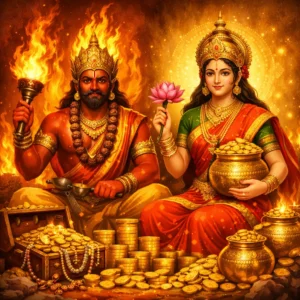* 七 shichi, the number 7, which is a lucky number,
* 福 fuku meaning “luck” or “good fortune”; and,
* 神 jin means “divine” or “God”.
In Japanese mythology, the seven gods of good fortune (七福神, Shichifukujin in Japanese) are believed to bestow good fortune.
In Japanese mythology, seven gods of good fortune dispense good fortune from a boat
* With money, gold, fish and rice;
* Longevity, with symbolic animals such as cranes or turtles;
* Prosperity, with complete bags and purses;
* Also magical objects, such as invisibility cloaks or hats or sacred keys, are used to fulfill the wishes of worshippers.
In ancient times these deities were worshiped separately, but this is rarely the case today.
ABSU (恵比須)
Ebisu is the god of prosperity and wealth in business, usually the god of crops, food and abundance. He is the patron saint of fishermen and so he is represented by a fisherman’s attire such as a plain hat, fishing rod in his right hand and carp, hake, codfish or sea bass or any fish that can be large fish, in general, symbolizing an abundance of food (e.g. feasting or feasting). ); . . . . It is now common to see his figure in restaurants that serve plenty of fish or in home kitchens.
Dicocutane (大黒天)
Daikokuten (大黒天) is the god of commerce and prosperity, and he is sometimes considered the patron saint of cooks, farmers and bankers, and the protector of crops. This deity is characterized by his smile, short legs and a hat on his head. He is usually depicted with a bag full of valuables.
Bishamonten (毘沙門天)
While Bisamonten’s (毘沙門天) origins can be traced back to Hinduism, he has been accepted into Japanese culture. He comes from the Hindu god Kubera and is also known as “Vaishravana” He is also associated with the god of luck, authority and status in war and battle. He is the protector of those who keep the rules and behave appropriately. As the patron saint of warriors, he is represented in armor and helmet with a pagoda in his left hand. He also serves as the guardian of sacred places and important places and holds a spear in his right hand and fights against evil spirits. He is usually depicted in paintings with a hoop of fire.
Benzytane (弁財天)
Benzaiten’s (弁才天 or 弁財天) origins can be found in Hinduism, as he comes from the Hindu goddess Saraswati. While adapting from Buddhism, he was attributed financial fortune, talent, beauty and music. He carries a biwa, a traditional instrument such as a Japanese lute, and is usually accompanied by a white snake. Artist, writer, dancer, patron of the geisha.
(南極星 “Nankiyokusei”)
Considered an incarnation of the South Pole Star (南極星 “nankyokusei”), Juroujin (寿老人) is the god of old age and longevity in Japanese Buddhist mythology. Symbolizing his affinity with longevity, he is represented with a long white beard, riding a deer, often accompanied by a 1,500-year-old tortoise. In addition, he is commonly represented under a peach tree, as the fruit of this tree is considered by Chinese Taoism to be capable of prolonging life. He holds a cane and a book or scroll. The wisdom of the world remains written on its pages. Jurojin loves rice and wine and is a very cheerful personality.
Hotei (布袋)
Hotei (布袋) is the god of luck, protector of children, patron of soothsayers and barmen, and also the god of popularity. He is depicted as a fat, smiling, bald man with a curly mustache. He always looks half naked, as his clothes are not wide enough to cover his massive belly. He carries a bag on his shoulders which is full of luck for those who believe in his virtues. The characteristics and qualities of hotei are contentment, generosity and happiness.
Fukurkuzu (福禄寿)
The god Fukurkuzu (福禄寿) also originated in China. He is the god of wisdom, luck, longevity, wealth and happiness, he is the only god who was said to have the power to resurrect the dead. Fukurokuzu is characterized by the size of his head, which is almost equal to the size of his entire body, and he is represented in traditional Chinese dress. He usually carries a cane in one hand and a scroll about the world in the other. He is usually accompanied by a tortoise, raven or deer, animals frequently used to symbolize longevity in Japan. It is also said that he likes to play chess, and is therefore the patron saint of chess players
Kichizoten (吉祥天)
Kichijoten adapted from the Hindu goddess Lakshmi through Buddhism. Kichijoten has attributes such as beauty, happiness and fertility.
Read More: 45 Benefits of Rakt Chandan Mala
Read More: Astrological 40 Simple Combinations for Characterless and Adultery in a Native Chart.
Read More: Career Growth, Prosperity, and Money with Vastu and Feng Shui Turtle
Read More: Improve Sexual Performance with Astrology and Vastu
Read More: The Effects of Moon on Man
Read More: 45 Tips for your Study Room and your Child’s Success
/*99586587347*//*54745756836*/











